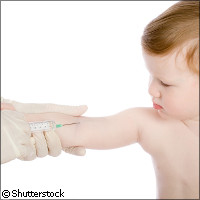Italian researchers investigate health of prison babies
For the first time ever, researchers in Italy have investigated the health of children born to imprisoned women. The study examined the clinical diaries of children who had lived in prison for one and half years between 2003 and 2005. The results of the study, published in the Scandinavian Journal of Public Health, suggest that these children represent a vulnerable group with specific healthcare needs. According to Italian law, children of mothers sentenced to prison or awaiting trial can live in specific 'nest areas' of the jail. However, in spite of the proximity to their mothers, there is a downside to this: the children must remain within the prison walls. By end-2005, the number of children aged up to three years living with their mothers in prison stood at around 100. The Italian Parliament in 2006 granted a major pardon to women prisoners effectively reducing the number. The researchers from the Institute of Paediatric Clinic of the Catholic University of Rome, Policlinico Agostino Gemelli, evaluated the health of the children living in the Italian capital's main prison, 'Casa di reclusione di Roma Rebibbia'. The sample totalled 150. The data of 150 children of the same age who had visited the paediatric surgeries of the Gemelli Hospital and of 91 children of immigrant parents living in Italy (both groups did not live in prison) were also used for comparative purposes by the researchers. The researchers initially measured the gestational age (i.e. the time between conception and birth) and found that 20% of the children who had lived in a jail had a gestational age lower than 37 weeks (the average length of a pregnancy) versus 9% of the children of immigrants and only 5% of Italian children. 'Of course environmental risk factors play an important role,' explained Dr Pietro Ferrara from the Institute of Paediatric Clinic, one of the co-authors of the study. 'Often women who end up in prison are subjected to infections, have wrong habits, like smoking or the intake of narcotics, and frequently pregnancy is not properly taken care of.' Breastfeeding is another key element, according to the researchers. Some 70% of the mothers of all three groups actively nurse their babies; the majority of mothers want to care for their children, experts say. However, the time for weaning comes earlier for babies in jail. 'An early weaning can predispose to the risk of hypertension and obesity,' Dr Ferrara commented. 'Early interruption of the contact with mother's milk can also lead to sensitisation towards food antigens, predisposing to allergies, and increasing the risk of intoxication of substances like preservatives or food colouring agents,' he added. 'In newborns, as a matter of fact, the detoxification processes are still not well developed.' What is the most differentiating factor between children born inside or outside of prison is the immunisation status, the researchers stated. 'When we realised this, we were really shocked. In Italian children the rate of vaccinal coverage is about 100%, which means that nearly all of them are correctly vaccinated,' Dr Ferrara underlined. 'Immigrants' children, who live through greater logistical and cultural hitches, still reach more than 80%. On the other hand, not more than 14% of the children in jail have been correctly vaccinated,' he explained. 'Of course, we are talking about few children over all, but let's not forget that these small ones are taking a very dangerous risk.' Despite the disturbing numbers, the researchers are hopeful for the future. 'First of all, because we have verified that today even inside a prison there is a good level of health assistance,' Dr Ferrara said, adding that doctors are taking preventative measures. Mothers are taught how to wean and given an explanation of how to correctly vaccinate children. Latest data show that the number of vaccinated babies has increased twofold. 'Of course, there's room for improvement, but let's not forget that children remain in prison for a variable amount of time, and it's hard to keep track of them once they are out.' Dr Ferrara pointed out that this research, while in its infancy stage, can be enhanced further. However, he noted that preventative and therapeutic assistance in jail is heading in a positive direction.
Countries
Italy



